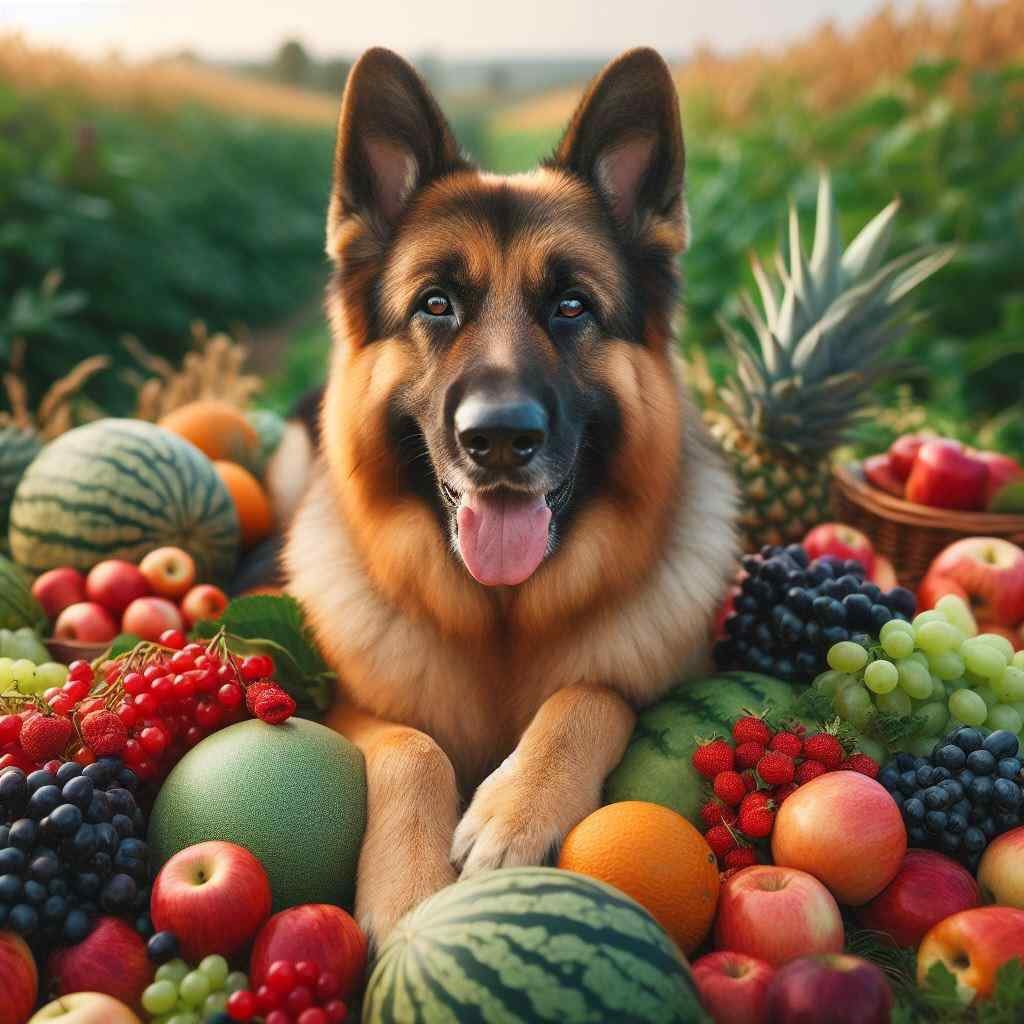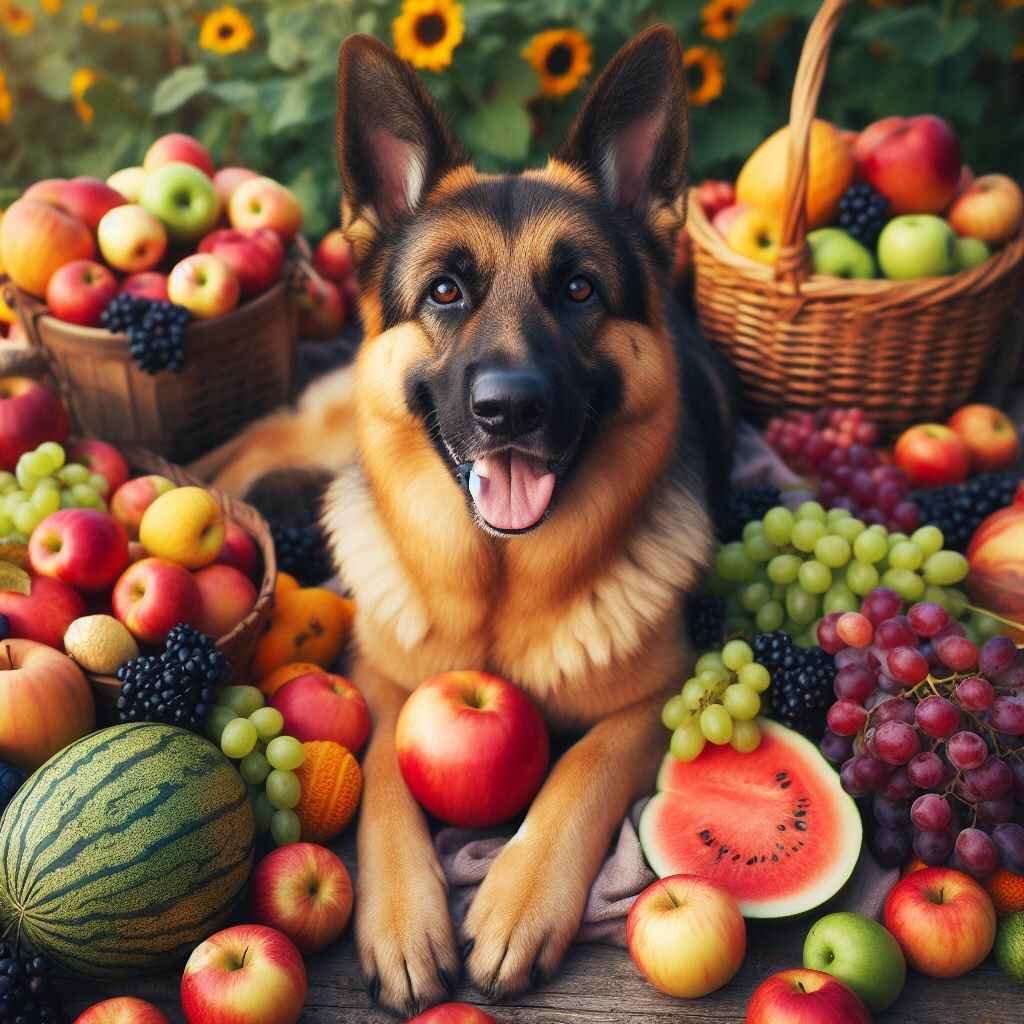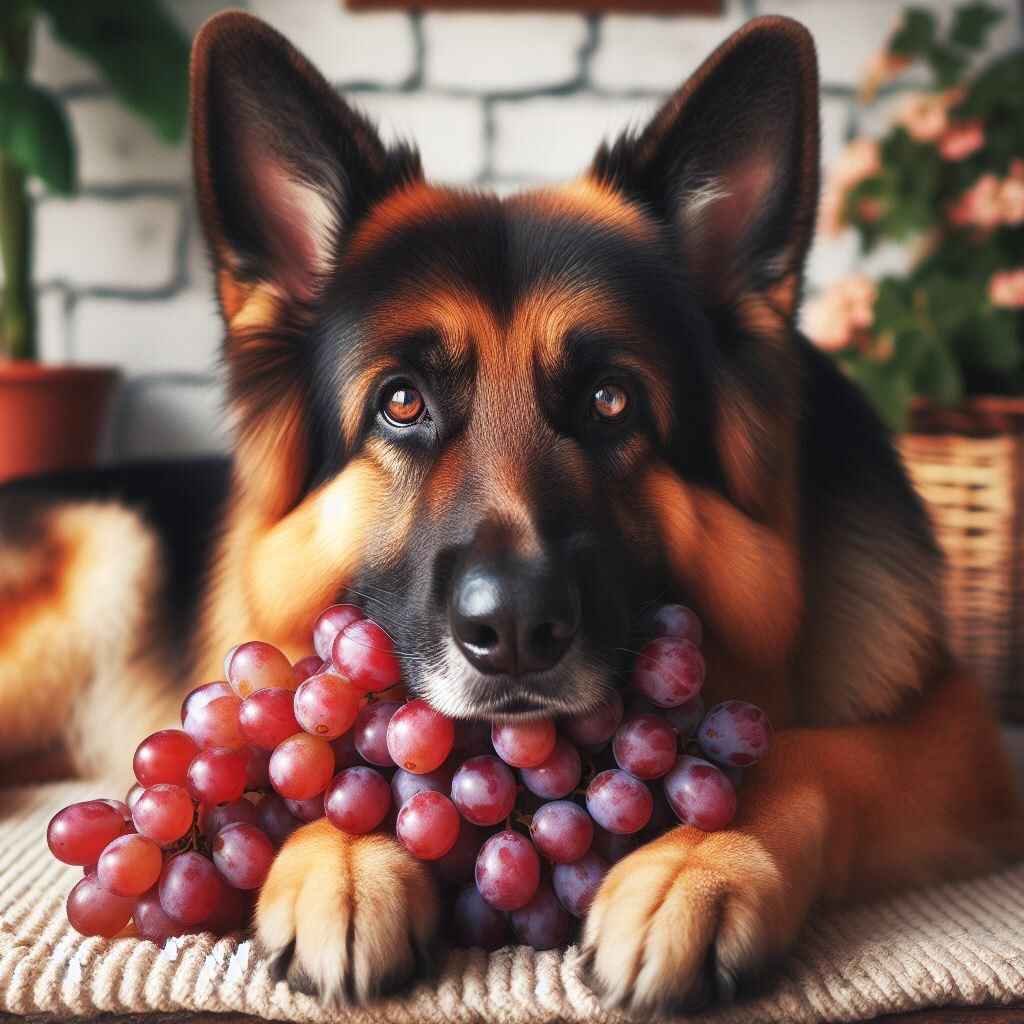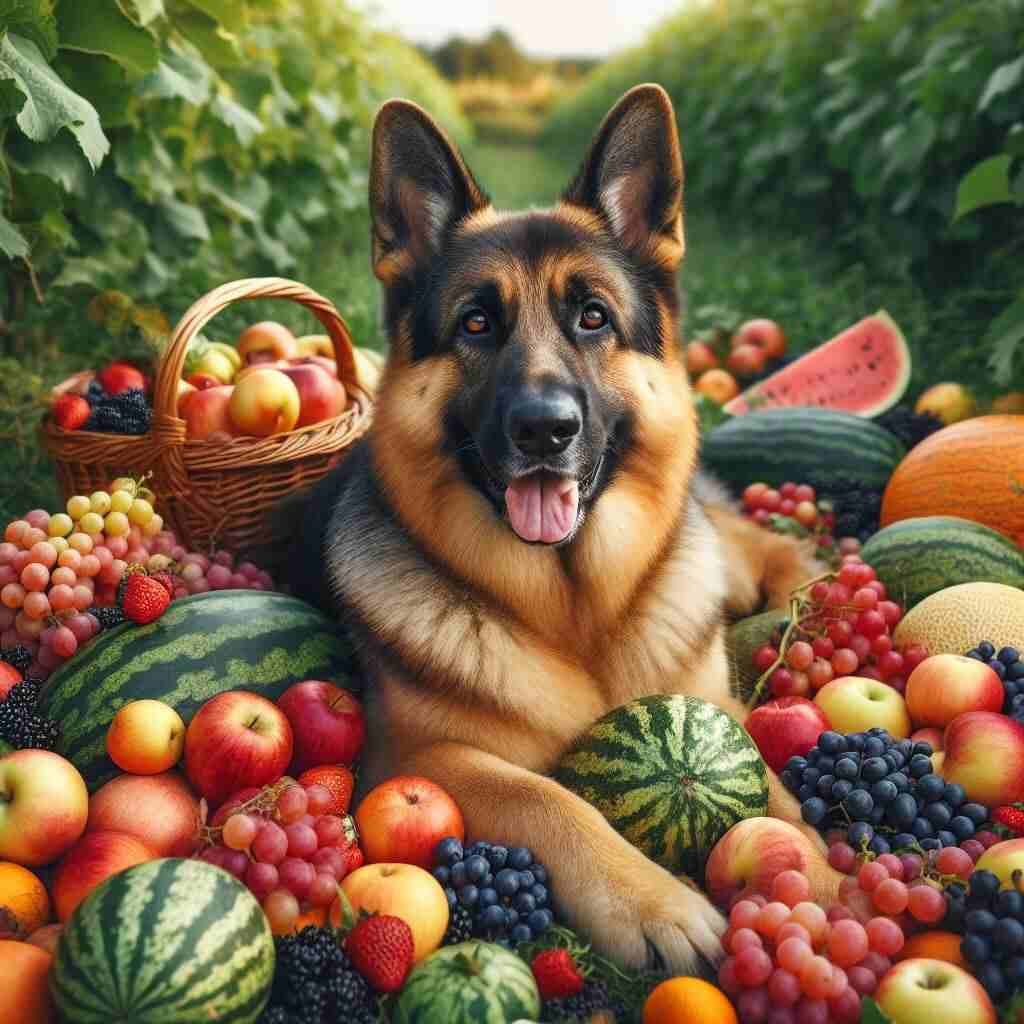Table of Contents
Treating my furry friend with delicious snacks is a must. But what fruits can German Shepherds eat? This became a crucial question in my quest for healthy and yummy options. The good news? Fruits like strawberries, apples (minus the seeds!), and blueberries are safe and delightful choices, packed with vitamins for a happy pup.
However, some fruits like grapes are a big no-no! Consulting a vet ensures I pick the right portions and avoid harmful ones. By carefully selecting fruits German Shepherds can eat, I can create a healthy and delicious diet that my dog will love.

Fruit Choices for German Shepherds: Good and Bad
Choosing suitable fruits for your German Shepherd is key for their diet. Fruits like apples, bananas, and blueberries are great for adding nutrition and can be fun, healthy treats. However, avoid giving them avocados, cherries, and grapes, as these can be harmful. Here’s a list to help you pick the best fruits for your dog’s meals and treats.
| Safe to Feed | Avoid |
| Apple, Apricot, Banana, Blackberries, Blueberries, Coconut, Cranberries, Cucumber, Dates, Kiwi Fruit, Mango, Melon, Nectarine, Peach, Pear, Persimmon, Pineapple, Raspberries, Satsuma, Strawberries, Watermelon. | Avocado, Cherries, Grapes, Lemon, Lime, Grapefruit, Olives, Oranges, Star Fruit, Tangerine, Tomato |
Giving your German Shepherd a mix of safe fruits helps them stay healthy, energetic, and happy. Here’s a quick guide on some good fruits for your dog:
Apple: Good for fiber and vitamins, but remove the seeds.
Banana: Offers potassium; fine as an occasional treat because of sugar.
Blackberries: Full of antioxidants and vitamins, good for snacks.
Blueberries: Boost health with their antioxidants.
Coconut: Has lauric acid, fighting off germs, but gives only a little.
Cranberries: Dogs can eat these in small amounts, fresh or dried, but not sweetened.
Cucumber: It is low in calories and full of water, making it a refreshing snack.
Dates: Sweet and okay in small amounts. Just take out the pits.
Kiwi: Packed with vitamins and fiber, but only give a little.
Citrus (Lemon, Lime, Grapefruit): Usually best to avoid because they can upset your dog’s stomach.
Mango: Vitamin-rich and safe after removing the pit.
Melon: Like watermelon, cantaloupe, and honeydew, it offers hydration, but watch the sugar.
Stone Fruits (Nectarines, Peaches, Plums): Remove pits and give sparingly.
Olives: Okay, in bits, but only the ones without pits and not in brine.
Citrus Varieties (Oranges, etc.): Can be had in tiny amounts, but generally not recommended.
Pears: Provide vitamins and fiber; take out seeds and core.
Pineapple: Sweet, nutritious, and okay in bits.
Raspberries: Low sugar, high in fiber and vitamins, refined in moderation.
Strawberries: Good for fiber and vitamin C, serve in small pieces.
Watermelon: Safe without seeds or rind and keeps your dog hydrated.
Adding these fruits to your German Shepherd’s diet brings variety and health benefits. Always introduce new foods slowly and in small amounts to see how your dog handles them before making them a regular snack.

Are German Shepherds Carnivores or Omnivores?
German Shepherds, originally carnivores, have evolved into omnivores due to domestication. Their diet now includes a balanced mix of meat, grains, fruits, and vegetables. This variety introduces essential nutrients, vitamins, and minerals vital for their health.
High-quality commercial dog foods often provide a balanced diet, but incorporating fresh produce can enhance immune function, reduce inflammation, and support overall well-being. Certain fruits and vegetables are deemed “superfoods,” offering additional benefits and disease prevention. Proper nutrient and calorie balance is crucial for maintaining the health of a German Shepherd.
Quantities and warnings
German Shepherds love treats, but healthy ones are best! Fruits can be a great option, but keep it to about 10% of their daily food. Here’s a quick guide:
- Good choices: Apples, bananas, berries (a few slices or pieces)
- Okay, in small amounts: Coconut, cucumber, dates (watch out for sugar and fat)
- Avoid: Citrus fruits (too acidic), stone fruit pits (choking hazard), persimmons, olives (seeds can be toxic)
- Good in moderation: Pears, pineapples, raspberries, strawberries (small pieces)
- Great summer treat: Seedless watermelon (remove rind)
Remember to remove seeds, pits, and stems to avoid problems. With these tips, you can add healthy variety to your German Shepherd’s diet.

Recommended Fruit Portion Sizes
Feeding your German Shepherd fruits is an excellent way to treat them with different tastes and nutrients, but it’s essential to do it in moderation. A small amount, like 1-2 apple slices or a few berries, is enough.
Fruits like cucumber and watermelon can be refreshing, especially in warm weather, but keep the portions small, such as 3-5 slices of cucumber or a slice of watermelon, and remove any seeds and rind to avoid health problems.
Be careful with peaches, plums, and apricots, as their seeds, core, and pit can be choking hazards or contain toxins. Also, it’s best to remove the peel, pith, and crown for fruits like orange, lemon, and pineapple to prevent stomach upset.
Here’s a simple table to guide you on the portion sizes and what to avoid:
| Fruit | Portion Size | Hazards to Avoid |
| Apple | 1-2 slices | Seeds, Core |
| Banana | 1-2 pieces | Peel |
| Blueberries | 2-3 berries | Rind |
| Cucumber | 3-5 slices | Seeds |
| Watermelon | 1 slice | Seeds, Rind |
| Peach | 2-3 bite-sized pieces | Pit |
| Orange | 1 bite-sized segment | Peel, Pith, Seeds |
This guide helps ensure your German Shepherd can safely enjoy fruits, adding a healthy variety to their meals.
Fruit Treats for your German Shepherd: Dos and Don’ts
Start small! Introduce new fruits slowly to avoid tummy troubles.
Beware of pits and seeds! Remove them to avoid choking or blockages. These might also be poisonous.
Wash it up! Give your dog clean fruit free of dirt and chemicals.
Cut it right! Make small pieces or puree them for easier eating.
Frozen Fun! Frozen berries are an excellent, low-calorie treat.
Skip the sugar! Avoid canned fruits, juice, and acidic fruits like oranges.
Healthy and Happy! With these tips, enjoy giving your German Shepherd a tasty and nutritious fruit treat.
Toxic Fruits To Avoid
Dog owners need to know which fruits are not safe for German Shepherds because some can be very harmful:

Grapes, Raisins, Sultanas, and Currants: Can cause kidney failure and even death in small amounts.
Avocado: Has persin, a toxin that can lead to vomiting and diarrhea. All parts of the avocado can be harmful, not just the skin and pit.
Star Fruit: Contains harmful substances that can make a dog lethargic, vomit, or have convulsions.
Green Tomatoes: Unripe tomatoes and the plant’s leaves and stems have solanine, a toxin that can cause stomach upset, tiredness, weakness, and confusion.
Cherries: Only the flesh is safe; pits, stems, and leaves have cyanide, which is very dangerous and can lead to serious health problems or death.
Rhubarb Leaves Are toxic and should not be fed to dogs.
Be careful with fruits from your garden or those that have fallen and started to rot, as they can produce ethanol (a type of alcohol) that is dangerous for dogs. Always keep your German Shepherd away from these toxic fruits to ensure they stay healthy and happy.
FAQs Abut What Fruits Can German Shepherds Eat?
What are the benefits of feeding your dog fruit?
Fruits can be a low-calorie treat option, providing essential vitamins and minerals that support a dog’s digestion and overall health. They also contain high levels of antioxidants, which can help reduce inflammation and combat disease. However, it is essential to know which fruits are safe for dogs and serve them in moderation.
What is the recommended daily fruit intake for German shepherds?
German Shepherds can safely consume a small amount of fruit daily, typically at most 10% of their daily caloric intake. Depending on the fruit’s calorie content, this equates to a few small pieces or slices. Always consult a veterinarian to determine the specific amount suitable for your dog’s health needs.
How do I know if a fruit is safe for my German Shepherd?
Research trustworthy pet health resources or consult a veterinarian to determine if a fruit is safe for your German Shepherd. Ensure the fruit, such as grapes or cherries, is not on the toxic list for dogs. Lastly, new fruits should be introduced slowly to monitor for adverse reactions.
How much fruit can I give to my German Shepherd in one serving?
A German Shepherd should consume a maximum of a few small slices or pieces of fruit for a single serving. This should be at most 10% of their daily calorie intake, keeping it to about a handful or less. Always prioritize their primary diet for nutritional balance.
Conclusion
German Shepherds can safely eat fruits like apples, bananas, berries, melons, and pears in small quantities. Avoid giving them acidic fruits like lemons and grapes, which can be harmful. Permanently remove seeds and pits to prevent choking or health issues.
Offering fruit as a treat can add variety and extra nutrients to their diet, making it a healthy choice for occasional snacks. Remember, fruits should be a small part of their diet, complementing their regular dog food.
